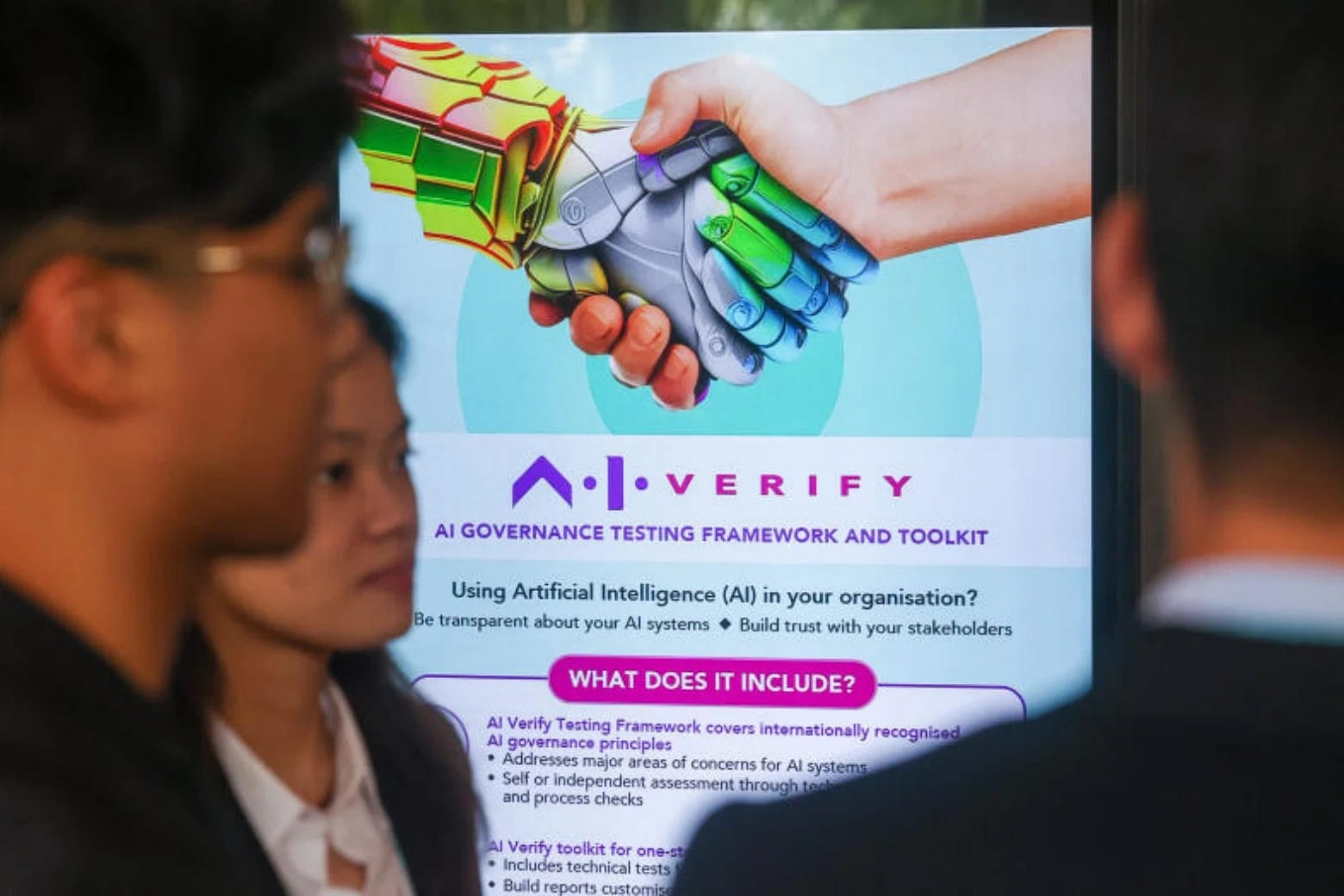Tech's Impact: How It Will Transform Our Lives And Influence Social Trends
Tech's Impact: How It Will Transform Our Lives And Influence Social Trends
From more immersive and predictive online experiences to improved medical solutions, tech developments can reshape industries and lives

Advances in technology will impact long-term social trends and businesses, changing the way we live, work and play.
Mr Christian Tan, 21, can’t imagine life without technology.
Most of his daily tasks are enabled by tech – from catching up with friends via video calls to conducting research for school assignments.
While the final-year polytechnic student is savvy, he’s also wary: “We need to be more vigilant to avoid scams and other online risks.
“But I’m hopeful. I think tech advancements will change the way we live for the better.”
This mix of caution and optimism extends to businesses today. While many may have adopted a wait-and-see approach in the past, there is a growing willingness to try out innovative technologies to enhance efficiency.
About 86 per cent of global businesses expect increased adoption of new technologies to drive transformation within their organisations, revealed the World Economic Forum’s 2023 Future of Jobs report.
Take the use of generative artificial intelligence (AI) to boost workplace productivity. Research by consulting firm McKinsey & Co this year found that automating tasks using generative AI and other technologies can save up to 70 per cent of employees’ time.
An eye on AI
Unlocking potential: How can Singapore better harness the benefits of AI while safeguarding jobs and livelihoods, and minimising other risks? Find out more about the national AI strategy.
Investing in innovation: The Republic is also developing an AI model that will incorporate the diverse cultures and languages of South-east Asia, addressing a gap in the market.
“The rise of generative AI presents immense opportunities for greater business value to be created and that will enable a more resilient and future-ready business landscape,” observes Mr Chia Song Hwee, Temasek’s deputy chief executive officer.
“However, it will also create new risks, such as issues around safety, accountability and robustness,” says Mr Chia, who is a member of Singapore’s Advisory Council on the Ethical Use of AI and Data.
The council, set up by the Ministry of Communications and Information in 2018, works with the Infocomm Media Development Authority (IMDA) to ensure the responsible development and deployment of AI solutions.
“It is imperative that we promote ethical and responsible use of AI for the betterment of society.”
Temasek also supports the AI Verify Foundation, a wholly owned subsidiary of IMDA launched in June. The foundation brings together over 60 companies to work with IMDA on addressing AI-related issues.
It has launched the AI Verify toolkit, which is available to all companies and allows them to test their AI systems against key ethics principles including safety and fairness.

The AI Verify toolkit, which is available to all companies, allows them to test their AI systems against key ethics principles including safety and fairness.
To Temasek, digitisation and sustainable living are two megatrends with pervasive impact across all sectors and business models of incumbent and emerging businesses.
Meanwhile, the future of consumption and longer lifespans reflect structural shifts in consumption patterns and growing needs, arising from population growth and increased longevity.
The Singapore-headquartered global investment company sees these four trends shaping society over the long term. It aligns its investments with these trends through venture building, fund investing and direct investments, as well as developing platforms that can address gaps in the marketplace.
Clarity amid complexity: The world faces significant challenges like persistent inflation, workforce disruptions and heightened geopolitical tensions. Here's how Temasek aims to chart a steady course forward.
Recognising the transformative role of technology in society, Temasek is also keeping a keen eye on advancements across ABCD (AI, blockchain, cyber security, and data and digital). It believes that technological transformations will impact how the four trends evolve.
“We have set up centres of excellence to build a suite of specialised, next-generation capabilities across ABCD to enhance our investment ecosystem,” says Mr Chia. “These can differentiate us as a value-adding investor and shareholder.”
So how exactly will advancements in the four trends transform our lives and society? Here’s what you can expect.
Digitisation and Your Work
What is it? Technology acts as an enabler, allowing us to reimagine new ways of working and disrupting sectors for greater efficiency, says Temasek’s Mr Chia. Think about how repetitive tasks can be automated to free up our time for more complex jobs, or how individuals can embrace generative AI to enhance the way they learn and work.
How will it change? The World Economic Forum's 2023 Future of Jobs report highlights new technology adoption and enhanced digital accessibility as the top two drivers of business and job transformation. AI, big data, cloud computing and cyber security are among the technologies gaining ground across industries over the next five years.
However, this predicted shift could lead to job disruptions, making training crucial. The report estimates that about 44 per cent of workers globally will encounter changes in their core skill sets in the next five years.

New technology adoption and enhanced digital accessibility were identified as the top two drivers of business and job transformation in the World Economic Forum's 2023 Future of Jobs report.
Sustainable Living and Your Home
What is it? The impact from climate change extends to various aspects of our lives, including the energy powering our homes and electronic devices. In Singapore, energy accounts for 40 per cent of the country’s overall carbon emissions, says the National Climate Change Secretariat.
How will it change? The Paris-based International Energy Agency believes that digitalisation will help to accelerate energy efficiency. For example, smart systems can collect and analyse data in real time and make adjustments autonomously, whether it’s to cool your home or optimise power grids for better stability.
Temasek believes that tools such as data analytics and AI will have widespread applications in the sustainable solutions space and, over time, deliver better value to consumers and businesses.
A greener, more liveable future
Sustainable scenarios: How will emerging green technologies transform our lives? Peek into the future with these solutions that can help us fly more sustainably and keep our produce fresher.
Bold initiatives: A global survey found that three-quarters of young people are “frightened” of the future due to climate change. Explore how businesses are stepping up on climate action to help.
Future of Consumption and Your Lifestyle
What is it? Many of our daily activities can now be performed with a mere tap on our digital devices. As technology advances and more digital-savvy consumers come of age, consumption patterns will continue to change.
A report by Google, Temasek and Bain & Company launched last month found that the digital economy in Singapore is expected to grow by 12 per cent to reach US$22 billion (S$29 billion) by the end of this year. It will reach approximately US$30 billion by 2025.
How will it change? “Travel, digital media, food and transport, e-commerce and digital financial services will continue to evolve in the coming years,” says Temasek’s Mr Chia.
The same report notes that there are significant growth opportunities in South-east Asia’s digital economy. Sectors such as health technology, education technology and automotive are likely to grow and can boost the digital economy as more people use them.

Many of our daily activities can now be performed with a mere tap on our digital devices, from buying items online to managing money.
Longer Lifespans and Your Life
What is it? We are living longer than before. The average life expectancy of Singapore residents currently stands at 83 years, up from 78 in 2000, according to the Singapore Department of Statistics.
About one in four Singapore citizens is projected to be aged 65 and above by 2030, up from one in six now, says the Ministry of Health’s White Paper on Healthier SG. This shift in demographics will lead to new opportunities and challenges related to health and wellness.
How will it change? Technology can bring about better ways of preventing and detecting illnesses, making healthcare more timely, precise and accessible.
“As a generational, long-term investor, we are able to support companies as they develop new therapies and innovative healthcare solutions,” says Mr Chia. This includes solutions that help meet medical needs that are not yet addressed, such as cell and gene therapy, and tackle age-related, neurodegenerative diseases like dementia.

Technology can bring about better ways of preventing and detecting illnesses, making healthcare more timely, precise and accessible.
We have set up centres of excellence to build a suite of specialised, next-generation capabilities across ABCD to enhance our investment ecosystem. These can differentiate us as a value-adding investor and shareholder.
Mr Chia Song Hwee, Deputy CEO, Temasek
ABCD, at a glance
Temasek is building a suite of specialised, next-generation capabilities in ABCD through strategic partnerships and investments to enhance the value of its investment ecosystem and the marketplace. Here are some examples:
AI: Aicadium, which serves as Temasek’s global AI centre of excellence, has offices in Singapore and the US. The global technology company develops and scales AI solutions, empowering businesses to leverage AI for better business outcomes.
In healthcare, for example, Aicadium built an AI-enhanced voice-based chatbot that allows patients to access fast, specific and accurate information without long hold times or physical visits.
Blockchain: Partior, an interbank network supporting multi-currency payments launched by Temasek in partnership with DBS and JPMorgan in 2021.
Partior focuses on leveraging blockchain technology to streamline the traditional cross-border payments model, which it says can be costly and time-consuming.
Cyber security: To strengthen cyber resilience, Temasek established Singapore-based Ensign InfoSecurity in 2018 to patent state-of-the-art machine learning and deep learning techniques, which are used to develop a suite of proprietary detection models.
Two years later, it launched ISTARI, a London-based global cyber platform that advises and curates tailored solutions for its clients.
Data and digital: Temus – a Singapore-based tech consultancy firm established by Temasek and global IT company UST in 2021 – is focusing on building specialised tech capabilities.
It is also contributing to workforce transformation in Singapore through Step IT Up, its talent conversion programme launched in 2022. Over the course of three years, the programme aims to train about 400 Singapore residents without a background in technology to become proficient digital professionals.
Source: The Straits Times © SPH Media Limited. Permission required for reproduction.
